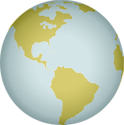Our Mission
GEOSHARE’s mission is to develop and maintain a freely available, global, spatially explicit database on agriculture, land use, and the environment accompanied by analysis tools and training programs for new scientists, decision makers, and development practitioners
Our Vision
GEOSHARE’s vision is that of a vibrant global network contributing to this shared infrastructure, enhancing capacity for analysis in developing countries, and applying these geospatial tools to guide decision making related to food security, land use, environmental sustainability and poverty reduction.
GEOSHARE will achieve its mission and vision by fulfilling three key objectives:
Objective 1:
To provide a globally consistent, temporally opportune, and locally relevant database for better decision making. GEOSHARE’s partners have a strong record creating both global and local spatial datasets widely used for discovery and decision making. Funding for these partners, obtained through GEOSHARE, will allow the development of the long-term relationships required to produce and update data under common standards for interoperability. These regional nodes are: the International Food Policy Research Institute (IFPRI), particularly through its activities in sub-Saharan Africa led by Node Director Dr. Stanley Wood; the International Rice Research Institute (IRRI, focusing on Asia), led by Node Director Dr. Andrew Nelson; and the International Center for Tropical Agriculture (CIAT), based in Cali, Colombia and focusing its efforts for this project on Latin America through Node Director Dr. Glenn Hyman. The data captured by the regional nodes will enrich the global data provided by the global research nodes. In the initial phase, the global nodes include three institutions: Stanford University (past and future climate) with Node Director Dr. Noah Diffenbaugh, McGill University (agricultural productivity, land cover and use) with Node Director Dr. Navin Ramankutty, and University of Bonn (irrigation, agricultural production and water use) with Node Director Dr. Stefan Siebert. The contents of GEOSHARE will be delivered through a HUBzero-based platform (more details below), making remote processing of data, simulation-based analysis and capacity building tools available to any individual with an Internet connection, anywhere in the world.
The nodal structure of GEOSHARE is readily scalable. By involving top scientific and analysis teams from around the world, the burden of funding this effort will be globally shared, thereby leveraging sponsors’ investments and increasing GEOSHARE’s sustainability. To ensure that developments in GEOSHARE address local problems and policy issues, GEOSHARE’s regional research nodes will interact with national and local stakeholders in the government and academic communities in their regional areas of influence
Objective 2:
To assist decision makers, policy analysts and researchers seeking to use geospatial data and analysis tools to inform activities relating to agriculture, poverty, land use and the environment. One of the key trends shaping the development landscape is that of global interconnectedness . GEOSHARE capitalizes on this trend by increasing stakeholders’ access to data sharing and analysis tools through remote computing via HUBzero technology, which provides interactive simulation and analysis tools via a Web browser, requiring no downloading of data or software (see Box 1). Through HUBzero, users can share their expertise by exchanging computer scripts and software ranging from simple spreadsheets to sophisticated simulation models such as Pegasus . This activity takes place ‘in the cloud’, powered by Purdue University’s high-capacity computing grids, without the need for specialized software or hardware at the user’s end. HUBzero opens endless collaboration possibilities. For example, a researcher without Geographic Information Systems (GIS) expertise, sophisticated hardware, or expensive software, interested in productivity-weighted average precipitation during the growing season for a given zone in Ethiopia, could reuse computer scripts written by a skilled user that created the same variables for Iowa, or the Bolivian highlands.
Objective 3:
To build capacity throughout the world in individuals who can effectively bridge disciplines to make decisions and to identify solutions to complex resource use and development problems using geo-spatial data and analysis tools. The GEOSHARE framework is designed to engage a broad, diverse learning community ranging from decision makers and seasoned practitioners to undergraduate students and budding scientists. Our overall outreach strategy is to advance knowledge and catalyze new approaches for development and resource use through an innovative cyber-infrastructure coupled with personal connections and networking. GEOSHARE aims to support graduate students undertaking training and research at partner institutions. It will also provide content for interdisciplinary courses at the undergraduate and graduate levels. As the GEOSHARE user community grows, we anticipate developing webinars, podcasts, online training activities, and other learning tools with direct input from the user/stakeholder community. Beginning in Year 3, GEOSHARE plans to initiate an annual global development challenge program for undergraduate students. Through the program, student teams will be given the opportunity to work with GEOSHARE mentors to apply their creativity to address a problem facing decision makers in developing countries by competing for funding that will allow them to cultivate their proposed solution, field-test their methodology in conjunction with one of the regional nodes, and measure the impact of their work. GEOSHARE’s open-source data platform lends itself well to innovation and will actively encourage new ideas to improve development objectives by establishing a second challenge program topically aligned with stakeholder needs and sponsors’ strategic goals, focusing on accelerating innovation through public- private sector partnerships.
Join Us
Take a tour of our web site and see how you can use our infrastructure to further your own research and educational activities. Create your own account. It's free and will give you access to our online simulation tools and other features. Become a contributor by uploading your own presentations and simulation tools for others to share. Ask a question in our community forum, and let the community help you out.
